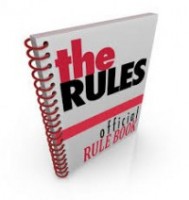
The rule of law subjects the State to a fixed set of rules that limits the scope of its coercive powers. Individuals and their property are protected from the arbitrary, ad hoc actions of the State and other individuals. In consequence, individuals can plan their activities within the confines of known, fixed “rules of the game.”
This allows people to pursue their personal ends, as long as their actions do not infringe on the broadly-defined property rights of their fellow citizens. When properly applied, the rule of law guarantees freedoms in the economic, political, intellectual and moral spheres.
Today, Venezuela has at best a tenuous grip on the rule of law. This is nowhere more visible than in the monetary sphere.
The country’s foreign exchange reserves are falling like a stone. Relative to the mighty US dollar, Venezuela’s currency, the bolivar, is also falling like a stone. As night follows day, inflation has soared as the bolivar has plunged.
Using exchange rate data that The Johns Hopkins-Cato Institute Troubled Currencies Project has collected over the past year, I estimate Venezuela’s current annual inflation rate to be 500 per cent. That’s the highest rate in the world.
Facing this inflationary theft, Venezuelan’s have voted with their wallets. Indeed, they have unofficially begun to dollarize the economy.
But the only way to establish the rule of law in the monetary sphere is to officially dollarize the economy by officially dumping the hapless bolivar and replacing it with the dollar.
Ecuador, where I served as the chief adviser to the Minister of Finance, when that country dollarized, offers some lessons that merit Caracas’ attention.
Ecuador was incapable of imposing the rule of law and safeguarding the value of its currency, the sucre. The Banco Central del Ecuador was established in 1927, with a sucre-dollar exchange rate of 5. Until the 1980s, the central bank periodically devalued the sucre against the dollar, violating the rule of law. In 1982, the central bank began to exercise its devaluation option with abandon.
From 1982 until 2000, the sucre was devalued against the dollar each year. The sucre traded at 6,825 per dollar at the end of 1998, and by the end of 1999 the sucre-dollar rate was 20,243. During the first week of January 2000, the sucre rate soared to 28,000 per dollar.
During the rout of the sucre in 1999, laws were passed that allowed bankers to make loans to themselves. In addition, state guarantees for bank deposits were introduced. These proved to be a deadly cocktail, one that allowed for massive looting of the banking system’s deposit base. This, as well as the collapsing sucre, enraged most Ecuadorians.
With the rule of law (and the sucre) in shambles, President Mahuad announced on January 9, 2000 that Ecuador would abandon the sucre and officially dollarize the economy.
The positive confidence shock was immediate. On January 11—even before a dollarization law had been enacted—the central bank lowered the rediscount rate from 200 per cent a year to 20 per cent. But, this newfound ray of hope was threatening to some, and during a 24-hour period (January 21–22), a coup d’etat ensued.
While the Mahuad government was toppled, the coup was a bungled affair and the former Vice President Gustavo Noboa assumed the Presidency. He honored Mahuad’s dollarization pledge.
With much the same enthusiasm as Ecuador’s coup plotters and the rigidity of a dogmatic cleric, the critics of dollarization condemned it as something akin to voodoo economics. Well, the critics have been predictably proven wrong.
The misery index is an objective measure of just how well dollarization has worked. The index is equal to the sum of the inflation rate (end of year), bank’s lending interest rates and the unemployment rate, minus the actual percentage change in GDP per capita.
A high index means higher misery. In Ecuador, prior to the implementation of dollarization in 2000, the country sustained a misery index of over 120. From 2003 through 2014, the misery index in Ecuador has been remarkably constant at around 20 – one of the lowest in Latin America.
Ecuadorians know that dollarization has allowed them to import a vital element of the rule of law – one that protects them from the grabbing hand of the State.
That’s why recent polling results show that dollarization is embraced by 85 per cent of the population. It’s time for Venezuelans, as well as many others, to take note and dollarize.
Author Steve H. Hanke

0 responses on "Why the Rule of Law Is Vital to the Value of Money"